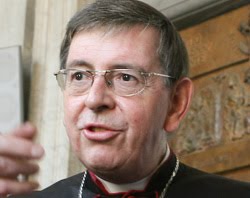 I et langt intervju på spansk på GaudiumPress snakker den nye lederen av Vatikanets enhetsråd, erkebiskop Kurt Koch, om hvordan Vatikankonsilets dokument om liturgien, Sacrosanctum Concilium, virkelig snakker om liturgien. De som kan spansk kan lese det her.
I et langt intervju på spansk på GaudiumPress snakker den nye lederen av Vatikanets enhetsråd, erkebiskop Kurt Koch, om hvordan Vatikankonsilets dokument om liturgien, Sacrosanctum Concilium, virkelig snakker om liturgien. De som kan spansk kan lese det her.
Noe av intervjuet er oversatt til engelsk, bl.a. dette som handler om messefeiring versus populum, bruk av latin og messen som et offer:
Gaudium Press – These two views [of the Church as People of God and as Mystery] also influence one’s position on the liturgy. How should the liturgy be understood today?
All those things that some people say that was new after the Second Vatican Council were not a theme of the Constitution on the Liturgy [Sacrosanctum Concilium]. For instance, celebrating the Eucharist facing the faithful was never an object of Tradition. The Tradition had always meant celebrating facing East, because that was the position of the resurrection. In Saint Peter’s Basilica, the celebration took place facing the people for a long time because that was the direction facing East. The second thing was the vernacular language. The Council wished that Latin remain the language of the liturgy.
Yet all those very deep, fundamental, things of the liturgical Constitution, are still ignored by many. For instance, the entire liturgy and the Paschal liturgy. The Easter of mystery, of death, and of the resurrection of Jesus Christ. One cannot celebrate the Paschal [mystery] without sacrifice, and that is the theme that is mentioned in theology. Because the Constitution on Revelation [Dei Verbum] is not yet known in the Church either. We still have much to do in order to receive the Council.
